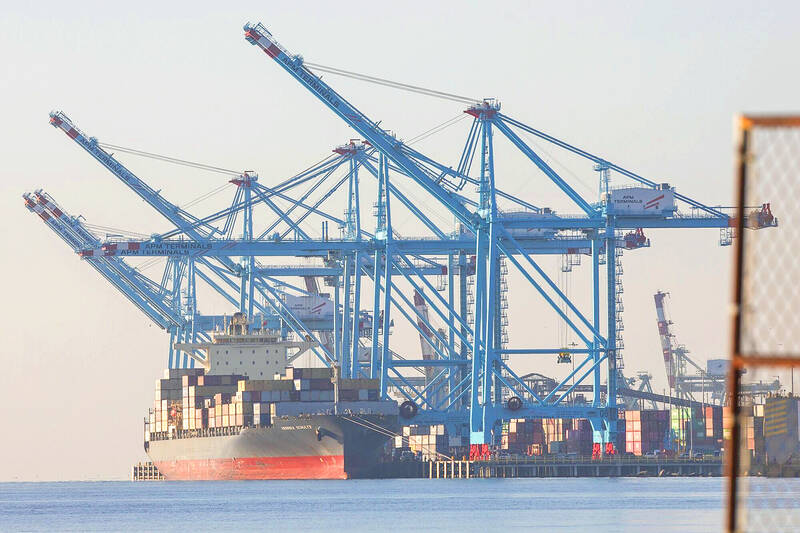US east and Gulf coast port workers were set to go on strike last night with no talks scheduled to head off a stoppage threatening to halt container traffic from Maine to Texas and cost the US economy as much as US$5 billion a day.
The labor contract between the International Longshoremen’s Association union representing 45,000 port workers and the United States Maritime Alliance (USMX) employer group was to expire last night, with negotiations at an impasse over pay.
A port strike would go ahead starting today at 12:01am local time, the union said on Sunday.

Photo: Bloomberg
The USMX “refuses to address a half-century of wage subjugation,” the union said in a statement.
If union members do walk off the job, it would be its first coast-wide strike since 1977, affecting ports that handle about half of the nation’s ocean shipping.
No negotiations are taking place and none were planned before the deadline, a person familiar with the matter said on condition of anonymity.
The union has previously said the strike would not impact military cargo shipments or cruise ship traffic.
However, a strike could stop the flow of everything from food to vehicles at major ports, potentially jeopardizing jobs and stoking inflation weeks ahead of the US presidential election.
Business Roundtable, which represents major US business leaders, said it was “deeply concerned about the potential strike at the east coast and Gulf coast ports.”
The group said a labor stoppage could cost the US economy billions of dollars daily, hurting businesses, workers and consumers across the country.
A short strike could have a limited economic impact given many companies have imported extra goods ahead of a possible work stoppage or shifted more shipments to west coast ports. However, a strike that continues for weeks could have serious economic impacts.
The strike could wedge labor-friendly US President Joe Biden into a no-win position as US Vice President Kamala Harris runs a razor-tight election race against former US president Donald Trump.
Biden on Sunday said he did not intend to intervene to prevent a walkout if dock workers failed to secure a new contract.
US presidents can intervene in labor disputes that threaten national security or safety by imposing an 80-day cooling-off period under the federal Taft-Hartley Act, forcing workers back on the job while negotiations continue.
Retailers that account for about half of all container shipping volume, and are headed into their all-important winter holiday sales season, have been busily employing backup plans.

STEEP DECLINE: Yesterday’s drop was the third-steepest in its history, the steepest being Monday’s drop in the wake of the tariff announcement on Wednesday last week Taiwanese stocks continued their heavy sell-off yesterday, as concerns over US tariffs and unwinding of leveraged bets weighed on the market. The benchmark TAIEX plunged 1,068.19 points, or 5.79 percent, to 17,391.76, notching the biggest drop among Asian peers as it hit a 15-month low. The decline came even after the government on late Tuesday authorized the NT$500 billion (US$15.2 billion) National Stabilization Fund (國安基金) to step in to buoy the market amid investors’ worries over tariffs imposed by US President Donald Trump. Yesterday’s decline was the third-steepest in its history, trailing only the declines of 2,065.87 points on Monday and

TAKING STOCK: A Taiwanese cookware firm in Vietnam urged customers to assess inventory or place orders early so shipments can reach the US while tariffs are paused Taiwanese businesses in Vietnam are exploring alternatives after the White House imposed a 46 percent import duty on Vietnamese goods, following US President Donald Trump’s announcement of “reciprocal” tariffs on the US’ trading partners. Lo Shih-liang (羅世良), chairman of Brico Industry Co (裕茂工業), a Taiwanese company that manufactures cast iron cookware and stove components in Vietnam, said that more than 40 percent of his business was tied to the US market, describing the constant US policy shifts as an emotional roller coaster. “I work during the day and stay up all night watching the news. I’ve been following US news until 3am

Six years ago, LVMH’s billionaire CEO Bernard Arnault and US President Donald Trump cut the blue ribbon on a factory in rural Texas that would make designer handbags for Louis Vuitton, one of the world’s best-known luxury brands. However, since the high-profile opening, the factory has faced a host of problems limiting production, 11 former Louis Vuitton employees said. The site has consistently ranked among the worst-performing for Louis Vuitton globally, “significantly” underperforming other facilities, said three former Louis Vuitton workers and a senior industry source, who cited internal rankings shared with staff. The plant’s problems — which have not

TARIFF CONCERNS: The chipmaker cited global uncertainty from US tariffs and a weakening economic outlook, but said its Singapore expansion remains on track Vanguard International Semiconductor Corp (世界先進), a foundry service provider specializing in producing power management and display driver chips, yesterday withdrew its full-year revenue projection of moderate growth for this year, as escalating US tariff tensions raised uncertainty and concern about a potential economic recession. The Hsinchu-based chipmaker in February said revenues this year would grow mildly from last year based on improving supply chain inventory levels and market demand. At the time, it also anticipated gradual quarter revenue growth. However, the US’ sweeping tariff policy has upended the industry’s supply chains and weakened economic prospects for the world economy, it said. “Now